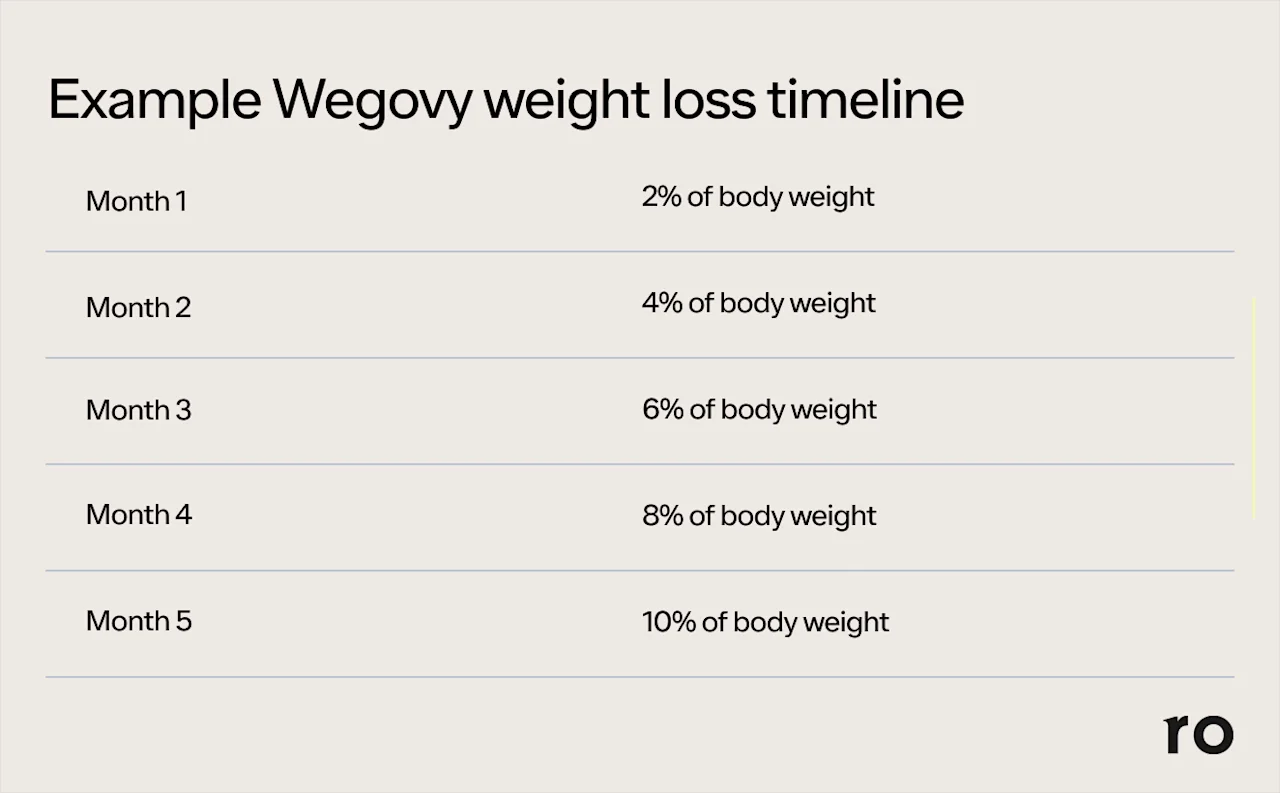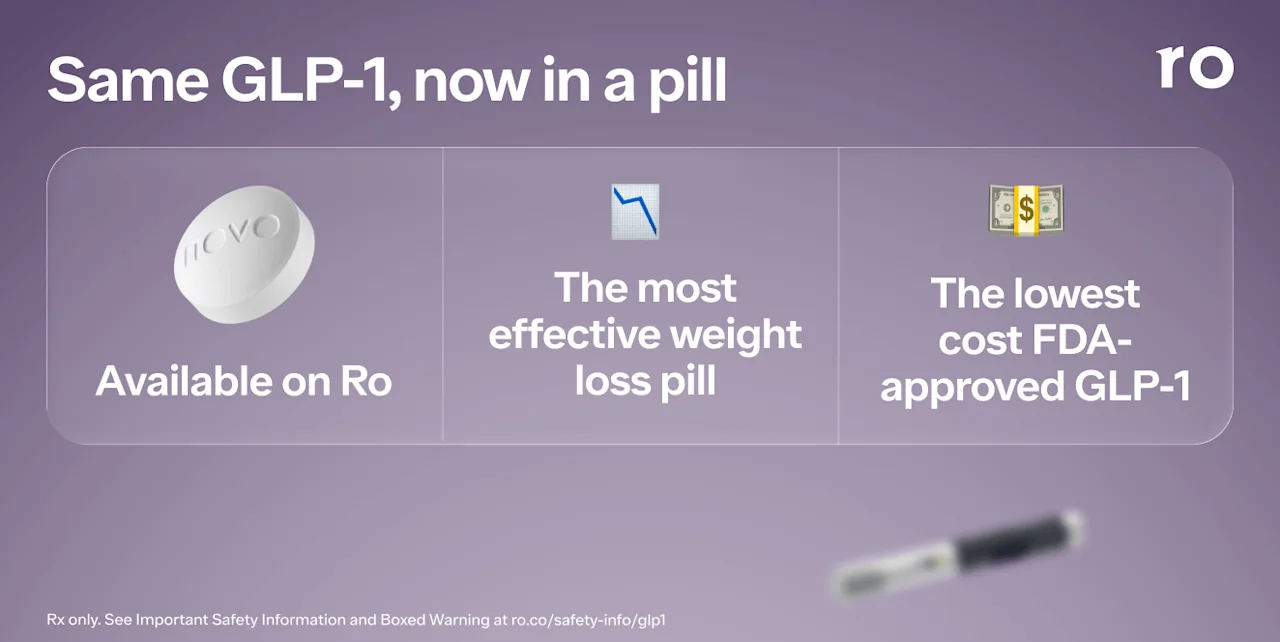Key takeaways
Wegovy starts working within 1–3 days of your first shot, although weight loss may take longer.
Many people notice weight loss results from Wegovy within 5–12 weeks after starting treatment. People also experience reduced appetite, fewer cravings, and an increased sense of fullness after eating.
Several factors can impact how long it takes Wegovy to work for weight loss. These include dosage and lifestyle changes, such as diet and exercise.
Here's what we'll cover
Here's what we'll cover
Here's what we'll cover
Key takeaways
Wegovy starts working within 1–3 days of your first shot, although weight loss may take longer.
Many people notice weight loss results from Wegovy within 5–12 weeks after starting treatment. People also experience reduced appetite, fewer cravings, and an increased sense of fullness after eating.
Several factors can impact how long it takes Wegovy to work for weight loss. These include dosage and lifestyle changes, such as diet and exercise.
Wegovy is a popular weight loss medication that only needs to be taken once a week. Given that, you might wonder how fast Wegovy works. So, exactly how long does it take Wegovy to work? How long for Wegovy to work for weight loss? The short answer is that semaglutide, the active ingredient in Wegovy, begins to affect your body within days. However, it may take several weeks to notice a difference in body weight.
Keep reading for everything you need to know about how long it takes Wegovy to work.
How long does it take for Wegovy to work for weight loss?
How long it takes Wegovy to work for weight loss varies from person to person, but most people notice changes within the first three months.
In one study, people on 1.7 mg and 2.4 mg doses of Wegovy lost an average of 6% of their body weight after three months and 11% after six months. The study only measured results at those points, so the exact timing of earlier changes wasn’t tracked. We know people lost weight along the way, but early losses were likely small (under 5%). More meaningful results showed up by the three-month mark.
It’s important to remember that weight loss is a process.
Wegovy reaches peak concentration in your body 1–3 days after your dose, but that doesn't mean you will lose weight that fast. You’ll probably notice Wegovy-related changes in appetite — like feeling full sooner, having fewer cravings, or quieter “food noise” — before you see changes in body weight.
At what dose does Wegovy start working?
Wegovy is designed to start working for weight loss once you reach the higher maintenance dosage of 1.7 mg or 2.4 mg per week. That usually happens 3 –4 months after starting treatment.
Wegovy treatment starts at a low dose (0.25 mg) to minimize digestive side effects and help your body adjust. Then your dose gradually goes up over time to a maximum of 2.4 mg once weekly. That starter dose is not intended for weight loss, and Wegovy’s clinical trials did not measure its effectiveness.
However,the effects of semaglutide are dose-dependent. Meaning, people on higher doses tend to experience stronger effects than those on lower doses.
A study that looked back at medical records from a weight loss clinic found that on average:
People who used higher doses of Wegovy (1.7 mg or 2.4 mg) lost about 7% of their body weight after three months and 12% after six months.
People who used lower doses (0.25 mg, 0.5 mg, or 1 mg) also lost weight, but not as much — about 5% at three months and 9% at six months.
Everyone’s results can look a little different, so the safest approach is to follow your healthcare provider’s instructions for your Wegovy injections and not take more than prescribed.
How quickly can you lose weight on Wegovy?
That answer varies from person to person. How quickly you lose weight on Wegovy depends on your dosage and lifestyle. (More on those factors below.)
Here’s an approximate Wegovy weight loss timeline for people taking 2.4 mg, the highest maintenance dose, based on research. On average, people taking semaglutide in studies lost about 15% of their body weight after 68 weeks (a little over one year).

How long does it take for Wegovy to kick in after the first shot?
Wegovy starts to take effect soon after the first shot and reaches peak concentration 1–3 days after each injection. You might notice Wegovy side effects or appetite changes kicking in at that point, but don’t be alarmed if you don’t.
Remember: After the first four weeks of treatment, your healthcare provider will likely increase your Wegovy dose incrementally. They’ll do this until they reach an amount that works best for you and has manageable side effects. So it’s possible you won’t notice any changes or side effects until your dose is bumped up.
How long does Wegovy take to work?
There are several factors that can affect how long it takes Wegovy to work. Let’s dive into those with the biggest impact.
Dosage
Your Wegovy dosage may affect how much weight you lose or how fast you lose it. One study found that people on higher doses of semaglutide, the active ingredient in Wegovy, lost more weight than those prescribed lower doses. Specifically, patients who received 1.7 mg or 2.4 mg of Wegovy per week lost an average of 6.9% of their body weight in three months. Those on doses of 0.25 mg, 0.5 mg, and 1 mg lost an average of 5.1% in the same period.
Whether you miss a dose
Missing a dose of any medication means that your body is temporarily missing out on the benefits of the drug. That’s true for Wegovy, too. If you skip a week, you could lessen Wegovy’s effectiveness and raise the risk of experiencing side effects when you resume treatment.
Wegovy should be injected once a week and on the same day each week. People who take their medication consistently and follow their prescription closely are more likely to experience weight loss results similar to those in clinical trials.
Other health conditions
Sometimes, underlying health conditions like Cushing’s syndrome or hypothyroidism can contribute to obesity or weight gain. If you have a health condition that makes it harder to maintain a healthy weight, it might also affect how quickly you’re able to lose weight on Wegovy. (Of course, it’s also possible that Wegovy will offer additional benefits related to your health condition, which is the reason some people take Wegovy for PCOS.)
Type 2 diabetes can also make it harder to lose weight quickly on GLP-1 medications like Wegovy. A clinical trial found that semaglutide users with type 2 diabetes lost about one-third less body weight than users without the condition.
Diet and exercise
Wegovy isn’t a magic bullet for weight loss. The drug’s prescribing information states that Wegovy should be combined with a reduced-calorie diet and increased exercise.
Following a Wegovy diet plan of fruits and vegetables, lean proteins, whole grains, and healthy fats might help maximize your weight loss results, including how long it takes to see them. And the same goes for physical activity. Making — and sticking to! — an exercise routine for weight loss can help support rather than slow the drug’s weight reduction effects.
Other lifestyle factors
But wait, there’s more! Lifestyle factors like poor sleep, chronic stress, and alcohol consumption can also make weight loss more difficult, thus slowing down your Wegovy weight loss results.
For example, did you know that ongoing sleep deprivation makes you more likely to snack? It’s possible that good sleep habits (e.g. getting 7–9 hours of shut-eye per night) might help curb mindless munching, which introduces extra calories into your day.
Stress may also boost your cravings and appetite, and research has tied alcohol consumption to weight gain.
The main thing to remember is that your weight loss pace on Wegovy can be impacted by many factors, from a not-so-healthy diet to feeling constantly frazzled by daily stressors.

How fast does Wegovy work for weight loss?
How quickly does Wegovy work for weight loss? There’s no one-size-fits-all answer. What we know for sure is that semaglutide starts working within days of the first dose, and on average, people start losing weight within the first three months.
The exact rate of weight loss with Wegovy varies from person to person. Underlying medical conditions, diet, and exercise can also impact the pace of weight loss.
Something to keep in mind is that rapid weight loss isn’t necessarily a good goal. The Centers for Disease Control and Prevention (CDC) recommends aiming for just 1-2 pounds per week for healthy, sustainable weight loss.
Plus, research shows that people who lose weight quickly — 5% body weight reduction in five weeks versus 15 weeks — tend to lose lean muscle mass in addition to body fat. The reason? When deprived of too many calories, the body starts breaking down muscle proteins into amino acids to help sustain other body tissues.
Fortunately, eating a high-protein diet can fuel your body’s amino acid supply to avoid muscle tissue loss. To support muscle mass and strength, most adults need 1–1.6 grams of protein per kilogram of body weight per day, depending on their activity level.
Research also shows that regular endurance exercise (e.g. jogging) or resistance workouts (e.g. body weight exercises) can help you maintain muscle mass while losing weight.
Point being: It’s normal to ask, “How quickly does Wegovy start working?” After all, if you start a treatment, you want to know what to expect. But for a healthy weight loss journey, focus on how much weight you want to lose, not how fast you can lose it. Slow, steady weight loss of 1-2 pounds per week can help you stay healthy while reducing your body weight.
That said, working with a healthcare provider is the best way to create a safe, realistic weight loss plan that fits your life. With Ro, you can connect with a licensed provider who will help you find an approach that works for you.
Ro weight loss
Curious about losing weight with Wegovy? Consider Ro.
With the Ro Body membership, you get access to some of the most effective GLP-1 medications approved by the US Food and Drug Administration (FDA), such as Wegovy. You also receive ongoing clinical support from licensed healthcare providers dedicated to creating a treatment that supports your individual goals.
Here’s what the comprehensive membership includes:
Ongoing clinical care from a Ro-affiliated provider, including monthly check-ins and unlimited, free messaging
Prescription for GLP-1 medications, such as Wegovy, Zepbound, or Ozempic (if eligible)
1:1 health coaching for behavior change support and accountability
Insurance concierge to help verify coverage, manage prior authorizations, and lower out-of-pocket costs
Side effect support, including prescriptions for anti-nausea medications if needed
App-based tools for keeping track of your doses, weight changes, and treatment updates
Ro’s weight loss program is designed to make clinical weight loss care more accessible, flexible, and affordable. And on that note… how much does it cost? Membership is $45 for the first month, then $145 a month after that. The price of GLP-1s isn’t included and will vary depending on your insurance and treatment.
Paying out of pocket? Or meds out of budget? Ro offers cash-pay options that are often much less than retail thanks to unique integrations with LillyDirect and NovoCare. You can get $100 off your first month, too.
Bottom line
Whether you’re considering Wegovy or just started treatment, it’s only natural to ask, “When does Wegovy start working?” And we’ve got the answer: Very soon after the first dose. As for how long before Wegovy starts working for weight loss? That depends on factors like dosage, underlying condition, and whether you’re sticking to a healthy diet and exercise.
Here are five takeaways to know:
Wegovy starts working after the first shot. It only takes 1–3 days before Wegovy reaches peak concentration in your body after each injection. So you might notice appetite changes right away, but it could take weeks — and possibly months — to lose a significant amount of weight.
Most people experience weight loss from Wegovy within three months. In one study, people on Wegovy lost about 2% of their body weight after one month and 6% after three months. Patience is key, though: By the end of the 68-week study, people averaged 15% weight loss.
Other factors affect weight loss pace, too. Dosage, whether you miss a dose, other health conditions, and lifestyle factors can all impact how much weight you lose on Wegovy — and how fast.
Focus on how much weight you want to lose, not how fast. Rapid weight loss can be unhealthy and unsustainable—and it can also mean losing muscle in addition to fat. The CDC recommends aiming to lose 1-2 pounds per week to stay healthy while reducing body weight.
If you’re not getting results from Wegovy, talk to your prescriber. A healthcare provider — such as one through Ro — can increase your dosage (if needed), offer dietary and exercise advice, and help rule out underlying conditions that might be impeding weight loss on Wegovy.
Frequently asked questions (FAQs)
How much weight can you lose on Wegovy?
How much weight you can lose on Wegovy may depend on your starting weight, how long you stay on Wegovy, and the lifestyle changes you make while on the medication. In one study, participants lost 15% of their body weight after 16 months on Wegovy.
How long should you take Wegovy for weight loss?
There is no set timeline for how long you should take Wegovy for weight loss. Most people take Wegovy for at least three months to see if it works for them. After that, Wegovy may be continued long term to support weight maintenance. Stopping Wegovy may lead to significant weight regain. Talk to your healthcare provider to decide how long you should take Wegovy.
DISCLAIMER
If you have any medical questions or concerns, please talk to your healthcare provider. The articles on Health Guide are underpinned by peer-reviewed research and information drawn from medical societies and governmental agencies. However, they are not a substitute for professional medical advice, diagnosis, or treatment.
Wegovy Important Safety Information: Read more about serious warnings and safety info.
GLP-1 Important Safety Information: Read more about serious warnings and safety info.
References
Ashtary-Larky, D., Ghanavati, M., Lamuchi-Deli, N., et al.(2017). Rapid Weight Loss vs. Slow Weight Loss: Which is More Effective on Body Composition and Metabolic Risk Factors?. International Journal of Endocrinology and Metabolism, 15(3), e13249. https://doi.org/10.5812/ijem.13249. Retrieved from https://pmc.ncbi.nlm.nih.gov/articles/PMC5702468/
Bergmann, N. C., Davies, M. J., Lingvay, I., et al.(2023). Semaglutide for the treatment of overweight and obesity: A review. Diabetes, Obesity & Metabolism, 25(1), 18–35. https://doi.org/10.1111/dom.14863. Retrieved from https://pmc.ncbi.nlm.nih.gov/articles/PMC10092086/
Cava, E., Yeat, N. C., & Mittendorfer, B. (2017). Preserving Healthy Muscle during Weight Loss. Advances in Nutrition (Bethesda, Md.), 8(3), 511–519. https://doi.org/10.3945/an.116.014506. Retrieved from https://pmc.ncbi.nlm.nih.gov/articles/PMC5421125/
Centers for Disease Control and Prevention (CDC). (2025). Steps for losing weight. Retrieved from https://www.cdc.gov/healthy-weight-growth/losing-weight/
Chao, A. M., Tronieri, J. S., Amaro, A., et al. (2022). Clinical Insight on Semaglutide for Chronic Weight Management in Adults: Patient Selection and Special Considerations. Drug Design, Development and Therapy, 16, 4449–4461. doi: 10.2147/DDDT.S365416. Retrieved from https://pmc.ncbi.nlm.nih.gov/articles/PMC9807016/
Geiker, N. R. W., Astrup, A., Hjorth, M. F., Sjödin, A., Pijls, L., & Markus, C. R. (2018). Does stress influence sleep patterns, food intake, weight gain, abdominal obesity and weight loss interventions and vice versa?. Obesity Reviews : An Official Journal of the International Association for the Study of Obesity, 19(1), 81–97. https://doi.org/10.1111/obr.12603. Retrieved from https://pubmed.ncbi.nlm.nih.gov/28849612/
Ghusn, W., De la Rosa, A., Sacoto, D., et al. (2022). Weight Loss Outcomes Associated With Semaglutide Treatment for Patients With Overweight or Obesity. JAMA Network Open, 5(9), e2231982. doi: 10.1001/jamanetworkopen.2022.31982. Retrieved from https://pmc.ncbi.nlm.nih.gov/articles/PMC9486455/
Gibbons, C., Blundell, J., Tetens Hoff, S., et al. (2021). Effects of oral semaglutide on energy intake, food preference, appetite, control of eating and body weight in subjects with type 2 diabetes. Diabetes, Obesity & Metabolism, 23(2), 581–588. doi: 10.1111/dom.14255. Retrieved from https://pmc.ncbi.nlm.nih.gov/articles/PMC7839771/
Hall, K. D. & Kahan, S. (2018). Maintenance of Lost Weight and Long-Term Management of Obesity. The Medical Clinics of North America, 102(1), 183–197. https://doi.org/10.1016/j.mcna.2017.08.012. Retrieved from https://pmc.ncbi.nlm.nih.gov/articles/PMC5764193/
Jensterle, M., Rizzo, M., Haluzík, M., et al. (2022). Efficacy of GLP-1 RA Approved for Weight Management in Patients With or Without Diabetes: A Narrative Review. Advances in Therapy, 39(6), 2452–2467. doi: 10.1007/s12325-022-02153-x. Retrieved from https://pmc.ncbi.nlm.nih.gov/articles/PMC9063254/
LaPelusa, A. & Kaushik, R. (2022). Physiology, Proteins. StatPearls. Retrieved on Sep. 8, 2025 from https://www.ncbi.nlm.nih.gov/books/NBK555990/
National Institute of Diabetes and Digestive and Kidney Diseases. (2023). Factors affecting weight health. Retrieved from https://www.niddk.nih.gov/health-information/weight-management/adult-overweight-obesity/factors-affecting-weight-health
Papatriantafyllou, E., Efthymiou, D., Zoumbaneas, E., et al. (2022). Sleep Deprivation: Effects on Weight Loss and Weight Loss Maintenance. Nutrients, 14(8), 1549. https://doi.org/10.3390/nu14081549. Retrieved from https://pmc.ncbi.nlm.nih.gov/articles/PMC9031614/
Rippe, J. M. (2018). Lifestyle Medicine: The Health Promoting Power of Daily Habits and Practices. American Journal of Lifestyle Medicine, 12(6), 499–512. https://doi.org/10.1177/1559827618785554. https://pmc.ncbi.nlm.nih.gov/articles/PMC6367881/
U.S. Food & Drug Administration (FDA). (2024). Highlights of Prescribing Information: Wegovy (semaglutide) injection, for subcutaneous use. Retrieved from https://www.accessdata.fda.gov/drugsatfda_docs/label/2025/215256s024lbl.pdf
Wharton S., Freitas P., Hjelmesaeth J., et al. (2025). Efficacy and Safety of Semaglutide 7.2 mg in Obesity: The STEP UP Trial. Presented at the American Diabetes Association (ADA) 85th Scientific Sessions, June 20–23, 2025, Chicago, IL, USA. Retrieved on Sep. 8, 2025 from https://sciencehub.novonordisk.com/content/dam/sciencehub/global/en/congresses-and-scientific-publications/congresses/ada2025/Wharton/documents/ADA25_STEP_UP_ePoster_slides.pdf
Wilding, J. P. H., Batterham, R. L., Calanna, S., et al. (2021). Once-Weekly Semaglutide in Adults with Overweight or Obesity. The New England Journal of Medicine, 384(11), 989–1002. doi: 10.1056/NEJMoa2032183. Retrieved from https://www.nejm.org/doi/full/10.1056/NEJMoa2032183
Wu, G. (2016). Dietary protein intake and human health. Food & Function, 7(3), 1251–1265. doi: 10.1039/c5fo01530h Retrived from https://pubmed.ncbi.nlm.nih.gov/26797090/














